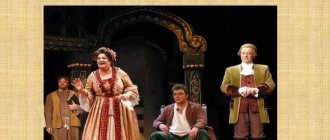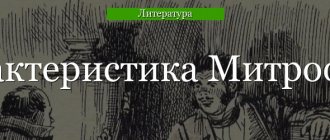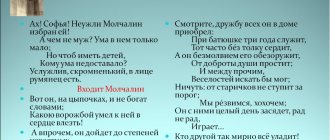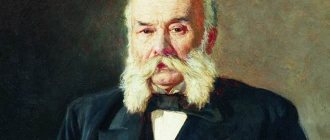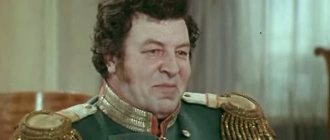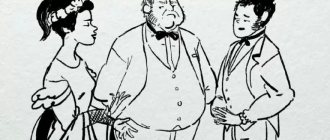One of Fonvizin’s many works is based on the relationships between different types of people in one area, namely the village of the Prostakovs. Pravdin’s characterization in the comedy “The Minor” is based on such positive aspects of a person’s character as love of truth and honesty. The meaning of this hero’s existence is to prevent cruel injustice against serfs.
Hero behavior
There are few positive characters in Fonvizin's comedy, but they all play significant roles. This includes Pravdin, a government official who came to the Prostakov estate in order to monitor the behavior of the owners and their attitude towards their subordinates. He hid his position and the purpose of his visit.
Pravdin values human rights and believes that no one should humiliate serfs; he cannot justify tyranny and cruelty. The official fulfills his task with unprecedented zeal, and he manages to expose the Prostakovs of atrocities.
The author gave all his characters speaking surnames . Pravdin was no exception. Its meaning lies in its fair and honest character. The official acts according to his principles and does not deviate from the intended goal. Dedication and patience define Pravdin’s views.
His appearance and manner of speech reveal a well-mannered and generous man. Pravdin's main character traits:
- honesty;
- respectful attitude towards the elderly;
- sincerity;
- loyalty to friends;
- courtesy.
The ideological official is presented by the author as an example for all civil servants. Fonvizin said that there are many more people like Pravdin. And as long as they honestly fulfill their duties, the state remains safe.
The employee seeks to convict evil landowners of cruelty and punish them. And this will improve the life of serfs and the well-being of the entire country.
In the comedy, the official is an opponent of the landowners who prefer to lie and flatter for personal gain. Pravdin tries to fight injustice and ignorance. The image of this character is the ideal of an educated and humane civil servant. He skillfully punishes the guilty and deservedly rewards the suffering. Fonvizin considers the official to be the personification of truth, humanity, and honesty.
Read also
The story of how one man fed two generals The Grandfather's Story (N.A. Nekrasov) The Song of the Falcon (Maxim Gorky) Poor people (F.M. Dostoevsky)
In the comedy “The Minor,” Pravdin is a positive hero, an honest official with humane views on estate management. According to the plot of the work, a man on duty ends up in the village of Prostakova in order to expose and stop the atrocities occurring there, punish the cruel landowners and take the estate under his own guardianship. The official successfully resolves an acute situation, punishing the guilty and helping those in need.
In “The Minor” as a classic play, the names of the characters largely determine their personal qualities and role in the work. Pravdin was no exception. In “The Minor,” the character’s personality characteristics fully correspond to the meaning of his last name – “Pravdin” from “truth,” that is, the hero is the bearer of truth and impartial justice. In the comedy, the official acts as an auditor, personifying the letter of the law, the highest justice and severity in decisions - he punishes the guilty, taking the village from the Prostakovs, finds out which of the teachers served honestly and who only deceived Prostakova. The man also decides Mitrofan’s fate, taking him into his service.
The character Pravdin plays an important role in the ideological concept of the comedy. In his image, Fonvizin portrayed the ideal of a humane and educated education official who deservedly rewards and punishes. For the author, Pravdin is the personification of humane, rational truth in the last instance.
Work test
- Question 1 of 18
Select the main features of a classic play inherent in the comedy “Minor”:- Fantastic location; exceptional, outstanding heroes;
Unity of place, action and time; a clear division of characters into negative and positive;
- The events of the play last several years, the characters are based on real historical characters;
- Extensive geography of ongoing events; typical, stereotyped heroes.
(new inset)
- Essays
- On literature
- Fonvizin D.I.
- Characteristics and image of Pravdin
There are not many positive characters in Fonvizin’s comedy “The Minor,” but they all carry a certain idea. This role is also played by Pravdin, a government official who settled with the Prostakovs in order to reveal their cruelty towards the peasants. He values human rights and is convinced that nothing can justify tyranny over peasants. He carries out his task with zeal and exposes the atrocities of the Prostakovs to the law.
There is no doubt that this character's surname is telling. It means that the hero stands for the truth, brings justice. He is dominated by such qualities as humanity, devotion to his principles and the desire to serve for the good of his country. And also patience and dedication, which lead to a happy ending.
From the first pages of our acquaintance with this character, we can be convinced of his honesty. He refuses to read a letter that is not addressed to him, and agrees only after a personal request from Sophia herself. This suggests that he is well-educated and always follows his own ideas about morality. Also from his conversations with Milo, it becomes clear that he is not only an honest official, but also a devoted friend. He sincerely rejoices at the happiness of Milon and Sophia and readily helps them when the need arises.
His respectful attitude towards Starodum is also noteworthy. Starodum, being a wise man who has seen a lot in his life, easily recognizes in Pravdin a highly moral and honest person. This is how Sophia sees him too. From the very moment they met, she was convinced of the deep education of this man and found it pleasant to communicate with him.
Pravdin personifies the strength of the state, its ability to protect the weak and punish the guilty. Fonvizin believes that it is on such honest and educated people that the future of the country is built. He sets Pravdin as an example to all government officials, believing that there are many such Pravdins, and they are ready to happily stand up for the truth.
Characteristics
The law-abiding official ended up in the Prostakov village, where he began to monitor the behavior of the owners of the estate. Pravdin is not indifferent to the fate of the peasants, so he immediately noticed the tyranny and cruelty of the silent Prostakov and his malevolent wife. Quote from the work: “I found the landowner a fool, and his wife a despicable fury, whose hellish disposition brings misfortune to their entire house.”
The official set himself the goal of legally stopping the cruelty of the owners of the estate and taking away the estate from them along with the serfs. He informed his superiors about the village's problems, hoping that the authorities would take appropriate action.
Pravdin characterized the Prostakov family based on their behavior:
- spineless stupid husband;
- two-faced, arrogant and rude wife;
- spoiled and lazy ignorant son.
In comparison with them, the orphan Sophia stands out for her calm disposition and modesty . It is Pravdin who warns Starodum - her uncle - about the bad attitude towards his niece. The hosts received the guest kindly, kissed his hands, and behaved hypocritically. Prostakova tried to prove to Starodum that her son was educated and hardworking. But Mitrofanushka did not know anything that was taught to him.
He told ridiculous essays instead of correct answers. The mother tried to justify her son by saying that education was not held in high esteem in their family.
In the love conflict that happened between Milon, Sophia and Mitrofan, Pravdin does not take much part. But the whole situation turned into a battle for the hand of a rich heiress, whose biography remained a secret for the Prostakovs until Starodum’s arrival. His story about the property that the girl received prompted the mistress of the estate to marry her son to her. This helped Pravdin see Prostakova’s true face, notice her greed and hypocrisy.
Image in comedy
With the help of Pravdin’s exceptionally positive role in the comedy “The Minor,” the author makes it clear that there are still honest and fair officials left. A civil servant despises everything that is not done according to the law. He does not change his position in any situation; he tries to calm down the masters who mock their serfs.
Pravdin is a highly moral and principled person. He declared a protest against the cruelty of the Prostakovs and decided to punish them for their stupidity and ignorance. Although the official is not a member of the landowner family, he decides their future fate. He took the land from the owners, but agreed to pay all debts for them. Although Prostakova gave him a bribe and was indignant at the “unfairness” of the sentence, Pravdin did not succumb to her persuasion and carried out his decision.
By describing the character of an official, Fonvizin shows the reader the ideal of a public and government worker. Pravdin cares about the future of his country, not forgetting about the common people - the serfs. He fights with all his might for the truth, rejecting barbarism, lack of education, cruelty and bribery.
The reader learns about the honesty of the official from the first pages of the comedy: “I never read letters without the permission of those to whom they are written” (quoted passage). He discovered cruelty and mercilessness towards the orphan Sophia, and called the Prostakovs greedy and envious. Together with Starodum, he put the estate in order and helped the lovers find happiness.
Essay about Pravdin
Pravdin is a government official who is called upon to understand the affairs of the Prostakov landowners. He learns about Prostakova’s greed and stinginess, and also that she takes away everything she has from Sophia. Using the help of Starodum and Milon, he takes away the estate from Prostakova, thereby punishing the landowner for everything she has done, mocking her greed and stupidity.
This hero, like everyone else in this comedy, bears a surname that characterizes him. Pravdin is a very honest and sincere person, he always does what is right and fair. From the very beginning of our acquaintance with this character, we can be convinced that he is very well-mannered and honest - he did not want to read a letter that was not addressed to him, but agreed only after Sophia personally asked him.
Pravdin serves as governor and controls the decrees of the entire province. He considers his main goal in life to be to stop the cruelty of nobles against ordinary serfs. In those days, landowners were very cruel to poor peasants. And especially the Prostakov family. Since the peasants could not stand up for themselves, Pravdin strictly monitored order in his province and, in particular, watched the Prostakovs.
Pravdin has a lot in common with Starodum. They both share each other’s opinions and are educated, literate and well-read people; both heroes do not tolerate cruelty and first of all look at the qualities of a person, and not at his financial situation and rank.
Pravdin has a positive and bright side in this comedy, since with his help the author shows the image in this comedy that all is not lost and there are still such noble people as Pravdin.
Pravdin never takes bribes, because he believes that this is very mean and low. But many landowners do not understand him, since they have been accustomed to lying and acting dishonestly all their lives. The author shows that if there are people like Pravdin, then everything is not hopeless and the problems with cruelty against serfs will improve.
Relationships with others
A speech description of Pravdin would not be complete without describing the official’s relationship with the Prostakov family. He speaks differently about the residents of the estate and its guests:
- mistress and owner;
- Mitrofanushka;
- Skotinina;
- teachers;
- Sophia;
- Milone;
- Starodum.
He considers the owner to be a real devil: she is a grumpy, domineering, greedy woman. She knows how to communicate with higher ranks, grovels before them, and constantly yells at her serfs and even hits them. Pravdin does not like her behavior, he ridicules it. The owner of the estate appears as a spineless, silent man. Prostakova's brother, Skotinin, behaves according to his last name. He talks only about his farm and pigs. Pravdin scoffs at such ignorance.
The long-awaited son Mitrofan was born into the family, whom everyone spoiled. They tried to teach him various sciences, but he could not remember anything he learned. The sixteen-year-old “minor” took an example from his mother: he mocked his teachers and nanny, and threatened to beat him because they forced him to do his homework. Mitrofan's teachers themselves did not receive proper education, so they could not teach the young man the sciences.
Kuteikin tried to teach Mitrofanushka to read and write, Tsyfirkin - the multiplication table and other arithmetic operations, and Vralman was a teacher of French, geography, history and other sciences. By their last names you can understand that in fact they are bad teachers. But the “minor” and his teachers did not evoke pity from Pravdin.
The official immediately liked Sophia due to her meek disposition and education. The well-read, literate girl briefly told him her story and complained about Prostakova’s contemptuous attitude.
Pravdin called Milon his friend; he was glad of his alliance with Sophia. The official considered Starodum’s aphorisms to be vital, and he respected his principles and education.
Fonvizin wrote his comedy with the aim of ridiculing the old views of provincial landowners. Their greed, illiteracy and derogatory attitude towards serfs had already become a relic of the past. But there were many people like the Prostakovs, and honest officials opposed them.
Essay 4
This character is the personification of an honest and humane official, an example of what a person in public service should be.
The essence of this minor character (like other heroes of the comedy) is expressed, in the traditions of the times of its creation, by his surname. If the Prostakovs and, in particular, Mitrofanushka, personify the vices inherent in the ruling class, then Pravdin is introduced into the works as the “punishing sword of the state,” the one who will give everyone what they deserve.
One of the purposes of writing a comedy, as its name suggests, is the author’s desire to condemn nobles who want to live for their own pleasure, and not serve the state, as law and custom dictate. In this regard, Pravdin, who restores order, is shown as an ideal landowner and civil servant. At least the author doesn't say anything about its shortcomings.
In addition to unswervingly following his duty, Pravdin is shown as a humane, polite and courteous person. However, Pravdin’s main advantage (besides the honest performance of his duties) is his commitment to education. The play constantly ridicules both the stupid and ignorant landowners and Mitrofanushka’s mediocre and lazy teachers, thanks to whom he did not become a worthy officer or official. Because of this, the author emphasizes Pravdin’s desire to fight ignorance, in which he sees the root of evil. The official not only fulfills his direct duties by appointing minors to the public service, and prevents the Prostakovs from showing cruelty towards the serfs, depriving them of the opportunity to dispose of their estate. He identifies Mitrofanushka's unworthy teachers, giving them what they deserve.
In general, we can conclude that in the image of Pravdin the author depicted power as such. Not being, of course, an opponent of the existing system, believing that there is no need for radical changes, and education and honest officials are enough to eliminate shortcomings, Fonvizin created the image of one of them. Pravdin shows a way to solve the problems facing society, a role model that the author encourages to follow.
